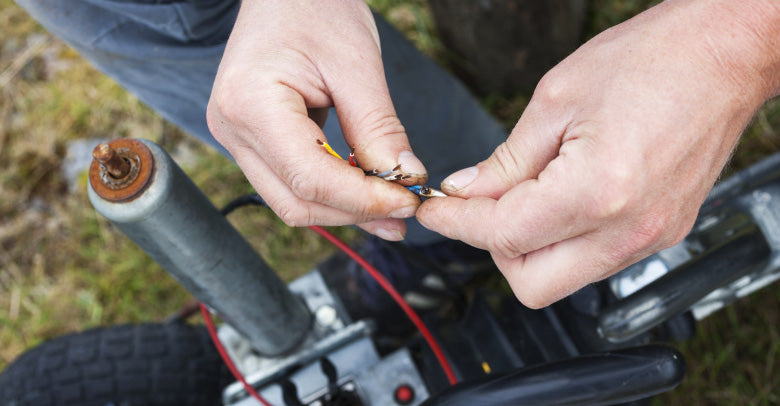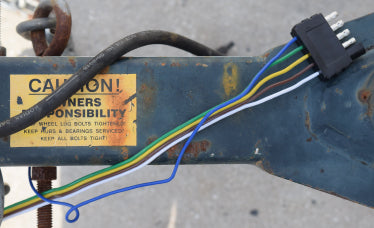

Troubleshooting Trailer Lights – A Boater’s Dilemma
There is little more frustrating than a problem with your boat trailer lights. Also, there are only a few things more dangerous than issues with the trailer light system.
Although this task is often overlooked, you need to check your trailer lights every time you hook up and get ready to go. But what should you do if you find yourself troubleshooting trailer lights problems? We’ll try to make the process as easy as we can.
If you are having a problem, first completely disconnect your tow vehicle from the trailer, including the chains. After disconnecting your tow vehicle from your trailer, follow these steps until you find the problem.
Troubleshoot your vehicle with a tow vehicle tester

Plug a tow vehicle tester into your vehicle’s tow connector to make sure the proper voltage is being pulled from the vehicle. You can buy testers inexpensively from PartsVu or another retailer. If the tester does not light up, the problem is with the vehicle, not with the trailer’s wiring or other components on the trailer.
Clean both connector plugs
Clean your vehicles tow hitch plug with an electronic contact cleaner and a little bit of sandpaper. Also, clean the connector plug. Spray the connector with an electrical contact cleaner and a little bit of sandpaper or an emery board to clean the contact pins. Finally, apply a little dielectric grease.
Are funky things happening? Grounding problems may be to blame
If the lights are dim, they only work sometimes, brake lights flashing when the turn signal is turned on, or other strange things are happening, you may have a ground wire problem. Actually, grounding problems are the cause of many boat trailer light wiring system problems, and it is a simple issue to fix.

Find the ground screw on the boat trailer — it is almost always a white wire. Disconnect it, clean the ground strap with fine sandpaper, spray with electronic contact cleaner, and apply some dielectric grease to create a good contact. If the ground screw itself is corroded, replace it with a new one.
Troubleshooting trailer lights – Is it a bad trailer light bulb or corroded sockets?
If you have incandescent trailer lights, it could be a bad trailer light bulb. Remove the bulb and clean the contacts with fine sandpaper, spray a little electronic contact cleaner, put a little dielectric grease on the base of a new bulb, and screw it in.
To clean corroded sockets, remove corrosion with fine sandpaper, and if you need to, use a small dowel to get into tight spaces. If the light still doesn’t work, you may have corrosion in the socket at the contact points.
Attach fine sandpaper to the end of thin dowel – a hot glue gun works well for this. Clean the contact points by spinning the dowel and moving it side to side.
Spray with electronic contact cleaner, and finally, put a dab of dielectric grease on the contacts and insert the bulb. If the light still doesn’t work, check the mounting bolts for the light to make sure they’re making clean contact with the trailer frame.
If you see corrosion, remove it with your sandpaper and recheck the lights.

To protect your bulbs, some boaters advocate unplugging trailer lights from the trailer frame before submerging the trailer. Incandescent light bulbs get hot from use and a sudden dip in cold water can crack the bulb.
If you have LED trailer lights, they can certainly go bad. In theory, LED lights last for a very, very long time. However, theory and reality, especially within the harshness of the marine environment, can be two different things.
LED trailer lights are much more sensitive to needing the correct voltage, and you are relying on the ground connection between your tow vehicle wiring and the boat trailer to make sure the voltage is right.
If the ground is weak with an incandescent light bulb, the bulb typically lights more dimly; however, LED lights are more prone to burning out when subjected to improper voltage. Also, always make sure by buy submersible trailer lights.
Light fixtures that are not designed to be submersible will likely not last long if they are LED or incandescent.
Checking for breaks in your boat trailer lighting
Connections are common failure points, so first check your trailer wiring system for wire connectors and 3M Scotchlocks. Then, closely inspect any points where running lights are installed as this wiring often passes directly through the metal frame and can chaff from vibration over time.If these more straightforward approaches are not working, you will need to check the trailer wiring by running a continuity test – connect a jumper wire to the connector pins and a continuity tester to the sockets.
A continuity tester contains a light bulb and a battery and the bulb lights when a circuit is working correctly. Test one wire at a time.
Alligator clips at the wire ends make continuity connections quick and easy. If the lights on one side still aren’t working, you may have a break in a wire.

To test for loose or damaged wires, check the color of the wire going to the socket and then find that wire on the connector in front. Clip one end of a long jumper wire to the connector pin and then clip the other end to the continuity tester.
If the light fails to go on, trace the wire and check for bare spots or breaks. If you find a break, cut the wire at the break, solder a new connection, and repair the insulation with heat-shrink tubing, which is available at any hardware store or home improvement center.
Is it time to replace your boat trailer wiring?
If your wiring is older, the coating is not in good shape, and there is evidence of significant corrosion, you’ll probably want to replace the wiring. Trailer wiring kits are inexpensive, and the wiring on many trailers is pretty simple–replacement may simply be the best solution.
Troubleshooting trailer lights can be a frustrating experience. However, we hope you find these tips on how to go about troubleshooting your trailer lights to be helpful.
Frequently Asked Questions About Trailer Lights
How can you reduce socket wire strain?
You can do so by using a cable clamp and a socket wire lead with ample length so that the wire does not because too taunt.
How can you best secure trailer wiring?
While there are many ways to secure trailer wiring, we do not recommend tape as it will wear out quickly, especially as it is exposed to the elements. Soldering is also not recommended because it would melt the wiring's coating and likely cause a short. Also, soldering wire would make it touch to move and adjust the wiring as needed. Large wire ties or wireframe clips and wire clamps are the recommended approach.












1 comment
Thanks for trailer trouble shooting video.. great easy to understand. Question : What light assembly could I buy and mount on the PVC guide post that would put another set of tail lights up higher? Thanks Jerry